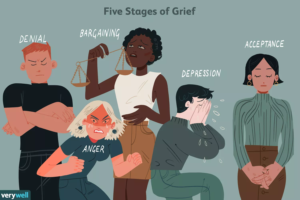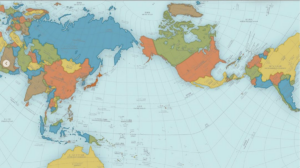Moving through the stages of grief, expat style
Grief is part of life and as global nomads we sometimes experience loss in unexpected ways. A trusted friend moving away can be one of these. There are many more tragic and irreversible things to live through but if you worked hard to find a friend, becoming close faster than you would in a non-expat context, this experience can really knock you out. It can affect you for a long time and may even impact future friendships.
Psychiatrist Elizabeth Kübler-Ross identified five stages of grief after the death of a loved one. When we lose a friend to a move, we experience the same stages of grief; not always sequentially and not all equally pronounced. Knowing this can help us move through the experience and stay open to future friendships.
The stages of grief are: denial, bargaining, anger, depression, and acceptance and are succinctly described here. Keep reading to see how these may be experienced when a friend leaves your shared expat location.
You did the work
Arriving in your new location you knew no one. You felt lonely and isolated but you had expected this, to a degree. You joined events, standing on the sidelines, scanning the room for a friendly face. You went on outings and to sponsored meet & greets for new arrivals. You put in the effort to find connection and eventually it paid off.
A few months after you landed in the great unknown you knew people. You had a group of acquaintances and one new BFF. You hung out, explored your new city and surroundings together, planned parties, hosted events, laughed, cried, shared expat worries and looked after each other’s kids. She knew more about you in a few months than some of your lifelong friends back home. Expat life wasn’t so bad anymore. In fact, it was thrilling, exciting and the best thing to ever happen to you.

And then it all changes
It’s expat life. We move. Often.
Your friend tells you she will be leaving at the end of the school year. You cry and hug and make plans to check off everything on her bucket list. You spend as much time together as possible, the families get along and you harbour this hope the move will be cancelled (denial raises its head). You may even try to persuade her husband to change his minds about moving – surely he has some influence on it! But bargaining won’t do. So finally you throw her a fabulous farewell party. The day they leave you take them to the airport and wave until they disappear past security.
Then, you turn around and as you leave the airport it hits you like a brick: you’re back at square one. Except maybe worse. Everywhere is connected to a memory. You’ve been negligent about participating in other groups. Perhaps you even snubbed them, because you were so happy and busy in your bubble. How can you ask to get in now? When we’re new, we quickly find other newbies in the same situation and small talk is easy, developing into first connections. But after a while we aren’t interested in those newbie conversations, we want to spend time with “old hands”. Except, they’re all connected and busy with their friends. It feels like there’s no space for us.
You knew you’d miss your friend but you didn’t expect this feeling of isolation. The grief and loss – for your friend and the life you had together – is powerful. You feel sad and depressed and never want to make friends again. I mean, what’s the point?
At some point anger comes into the equation. It might be directed at your friend for leaving. Or at your husband for dragging you to this god-forsaken-place. Or at the company for moving them. Or at other spouses that are having a grand time. Or at yourself for loving deeply and letting yourself get hurt. Anger is part of the grieving process and may creep up on you at any time. Possibly over and over again. It’s normal.


You've done this before, you can do it again
The final stage of grief is acceptance. But now what? You’re alone again. Well, guess what? You have choices. You’ve made friends before, you know how to do it and you can do it again. Or, you can harden your heart and stay on your own, afraid of getting hurt. I’ve tried both of these approaches. Neither is easy but only one pays off in the end.
Making friends (again) takes work but it’s worth the effort. Maybe this time you will be more careful, more hesitant and slower to go deep fast. I suggest mixing it up and getting involved in group activities as well as individual friendships. Cast your net a little wider and find connection in the local community that is less likely to move (although you might meet resistance here since they too are tired of making friends that leave). I wrote about local connections in this post. Your people, your person is out there, you just have to find her – again.

A final word – keep your eye out for the woman that has just experienced this type of loss. Be kind to her and invite her to your next gathering, even if she never used to come. She might need a fresh start right now and be too hurt and shy to ask.






